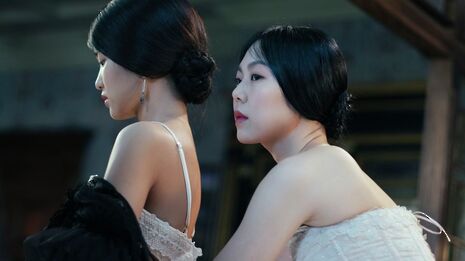Review: Tension and beauty in The Handmaiden
Following a trip to the cinema, Emily May and Jack Wearing discuss the latest from Park Chan-Wook in all its homoerotic glory.

EM: The audience never quite knows where they stand with The Handmaiden's twisting narrative. It shifts restlessly from one character’s perspective to the next, and back again. We set off thinking we know the deal: the sheltered aristocrat driven mad by confinement, the young woman from an obscure rural village, let homoerotic tension ensue! Which it does – but there's far more to it than that. Plus, it’s not the audience, but the men that are at the butt of the film’s joke: a slick mastermind made ridiculous, and an abusive old man made pathetic. They deserve each other.
“It's the first film I’ve seen with a POV vagina shot. That's a gynocentric gaze if I ever saw one.”
JW: Regarding the homoeroticism, the lesbian sex scenes were lengthy and explicit, but they did serve both plot and character (unlike Blue is the Warmest Colour, for instance, where they come out of nowhere and are narratively superfluous). There are scenes where aristocratic men listen to pornographic stories, framed to look like the audience at a cinema, so I wonder if the film is commenting on the male gaze with the lesbian scenes. What's your take?
EM: One of the most significant moments in those scenes is when she reads lesbian erotica for her audience. The lights go out, and only we can see her in this moment of self-discovery. She's almost surprised at her response. Unbeknownst to the men present, it becomes her fantasy. The final scene has the protagonists parody this passage, in a redemptive collision of vengeance and free love.
It's also telling that they first become intimate play-acting the looming wedding night. The prospective groom becomes a verbal intermediary – an alibi for something entirely authentic: “Will he be as tender as this?” It's awkward, funny and warm – not titillating Asian girl-on-girl spectacle for a heterosexual male gaze. It undoubtedly will be viewed that way by some, but Chan-Wook can’t be faulted for the stubborn racism and heterosexism of cinematic audiences. It’s worth mentioning that this is the first film I’ve seen with a POV vagina shot. That's a gynocentric gaze if I ever saw one.
JW: I was surprised at just how funny it was. Chan-Wook is really gifted at visual comedy, and the dialogue is sharp, but that dimension of his work is often overlooked. It's easy to remember the more horrific scenes of a film like Oldboy and forget the humour, whereas The Handmaiden is a more romantic film. That interplay is a great aspect of his work.
In Chan-Wook’s films, the protagonists stay sympathetic despite committing deeply morally grey actions, and that moral complexity definitely exists in The Handmaiden. It's interesting that we’re on Sook-hee’s side throughout, even though her initial motivations are dubious. That's partly because Kim Tae-Ri plays her as clumsy and clueless, but also very passionate. In the director’s cut, you find out those motivations half-an-hour in, whereas in the theatrical cut, you discover them almost immediately. The former is marginally more engaging, but you identify with her differently; there’s another layer of distance between appearance and reality.
The line of dialogue that really struck me the second time was in Sook-hee’s inner monologue, when she says, “Everyone’s performing their roles so damned well.” It’s a clever line, because she’s right, but – as we learn later – for completely the wrong reasons. Like the audience, for most of the film she doesn’t quite see through all the layers of artifice. It’s a beautiful film on a purely visual level, with exceptional production design and cinematography. But on both viewings, I think what really gripped me were those thematic complexities – moral, psychological, and narrative
 News / Cambridge academics sign open letter criticising research funding changes22 February 2026
News / Cambridge academics sign open letter criticising research funding changes22 February 2026 News / Supporters protest potential vet school closure22 February 2026
News / Supporters protest potential vet school closure22 February 2026 News / University Council rescinds University Centre membership20 February 2026
News / University Council rescinds University Centre membership20 February 2026 News / Hundreds of Cambridge academics demand vote on fate of vet course20 February 2026
News / Hundreds of Cambridge academics demand vote on fate of vet course20 February 2026 Comment / A tongue-in-cheek petition for gowned exams at Cambridge 21 February 2026
Comment / A tongue-in-cheek petition for gowned exams at Cambridge 21 February 2026








